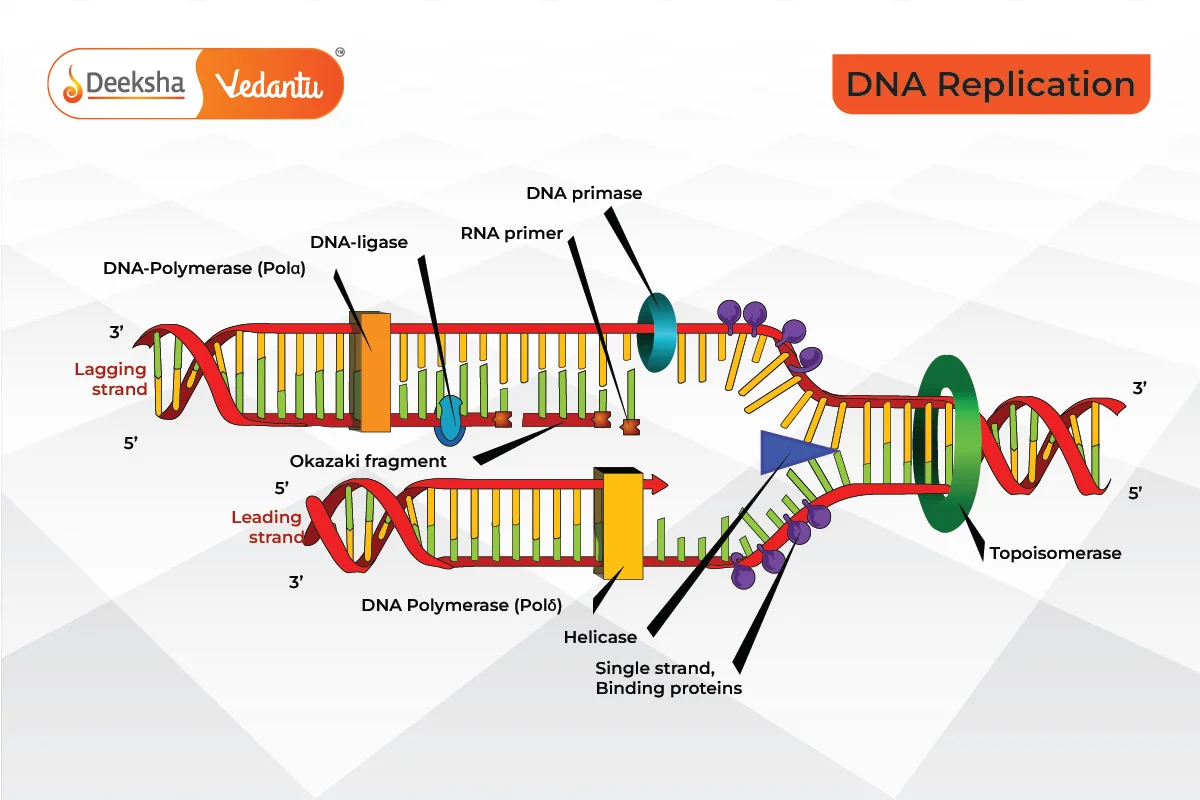DNA polymerases are a group of enzymes crucial for DNA synthesis. They play a vital role in DNA replication and repair, ensuring genetic information is accurately passed on during cell division. The first DNA polymerase was purified and characterized from E. coli by Arthur Kornberg. This enzyme, now known as DNA polymerase I, paved the way for discovering multiple DNA polymerases in various organisms, including humans.
DNA Polymerase Definition
DNA Polymerases are a group of enzymes that catalyze the synthesis of DNA during replication.
DNA Polymerase Function

- Replication The primary function of DNA polymerases is to replicate DNA. This process is essential for cell division, allowing genetic information to be accurately transmitted from one generation to the next. DNA polymerases add deoxyribonucleotides to the 3’-OH group of the growing DNA strand, ensuring the new strand is synthesized in the 5’→3’ direction.
- Repair DNA repair is crucial for maintaining genome integrity. DNA polymerases play a key role in correcting errors that occur during DNA replication and repairing DNA damage caused by environmental factors. They are involved in various repair mechanisms, ensuring the proper functioning of the genome.
- Proofreading During DNA replication, errors can occur. DNA polymerases have proofreading abilities to correct these errors. They possess 3’→5’ exonuclease activity, which allows them to remove mismatched nucleotides and replace them with the correct ones, enhancing the fidelity of DNA replication.
DNA Polymerase Structure and Types
The structure of DNA polymerases typically resembles a hand holding active sites. The active site has two parts: the insertion site, where nucleotides are added, and the post-insertion site, where the newly formed base-pair migrates.
Prokaryotic DNA Polymerase Types and Functions
- DNA Polymerase I
- Gene: polA
- Function: Involved in recombination and repair. Removes RNA primer and fills the gap in the lagging strand.
- Exonuclease Activity: 5’→3’ and 3’→5’
- DNA Polymerase II
- Gene: polB
- Function: Primarily involved in DNA repair and acts as a backup for DNA polymerase III.
- Exonuclease Activity: 3’→5’
- DNA Polymerase III
- Gene: polC
- Function: Main enzyme for replication in E. coli.
- Structure: Composed of 13 subunits, including 𝜶, 𝟄, 𝞱 (core domains), and 𝝲 complex (clamp-loading complex).
- DNA Polymerase IV
- Gene: dinB
- Function: Involved in DNA repair during the SOS response.
- DNA Polymerase V
- Function: Involved in translesion synthesis during SOS response and DNA repair.
- Structure: Composed of UmuC monomer and UmuD dimer.
Eukaryotic DNA Polymerase Types and Functions
- DNA Polymerase 𝝳
- Function: Main enzyme for replication in eukaryotes.
- Exonuclease Activity: 3’→5’ (proofreading).
- DNA Polymerase 𝜶
- Function: Synthesizes primers for DNA replication.
- DNA Polymerase 𝟄
- Function: Involved in DNA repair and primer removal.
- DNA Polymerase 𝝲
- Function: Responsible for mitochondrial DNA replication.
How Does DNA Polymerase Work?
DNA polymerases add nucleotides to the 3’-OH group of the growing DNA strand through a phosphoryl group transfer reaction. The process requires two Mg ions at the active site. DNA polymerases cannot initiate DNA synthesis and need a primer to start the process.
Steps:
- Primer Binding: A primer, usually an RNA oligonucleotide, provides the 3’OH group for DNA polymerase to start adding nucleotides.
- Nucleotide Addition: DNA polymerase adds nucleotides complementary to the template strand.
- Proofreading: Incorrect nucleotides are removed by the 3’→5’ exonuclease activity of DNA polymerase.
FAQs
DNA polymerases contribute to genetic variation by their role in DNA repair and replication. Errors during replication can lead to mutations, which are a source of genetic diversity.
DNA polymerase III is the primary enzyme responsible for DNA replication in E. coli. It has high processivity and a proofreading function to ensure replication accuracy.
DNA polymerases need a primer to provide a 3’-OH group for the addition of nucleotides. They cannot initiate DNA synthesis de novo.
DNA polymerase 𝝳 is the primary enzyme responsible for DNA replication in eukaryotes.
Prokaryotes, like E. coli, have five main DNA polymerases: DNA polymerase I, II, III, IV, and V, each with specific functions in replication and repair.
DNA polymerases have proofreading abilities. They possess 3’→5’ exonuclease activity that removes mismatched nucleotides and replaces them with the correct ones.
DNA polymerases are responsible for synthesizing DNA during replication and repairing damaged DNA, ensuring the accurate transmission of genetic information.
Related Topics
- Bryophytes
- Parenchyma Cells
- Epithelial Tissue
- Plasma Membrane Structure
- Important Notes For NEET Biology – Chromosome Structure
- Important Notes For NEET Biology – Anatomy of Flowering Plants
- Important Notes For NEET Biology – Breathing and Exchange of Gases
- Connective Tissue
- Protozoa
- Important Notes For NEET Biology -Shapes of Bacteria
- Important Notes For NEET Biology – The Living World
- Types of Fermentation
- Paramecium
- Marchantia
- Plasmid












Get Social